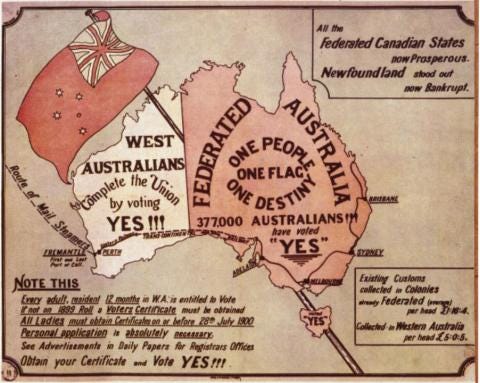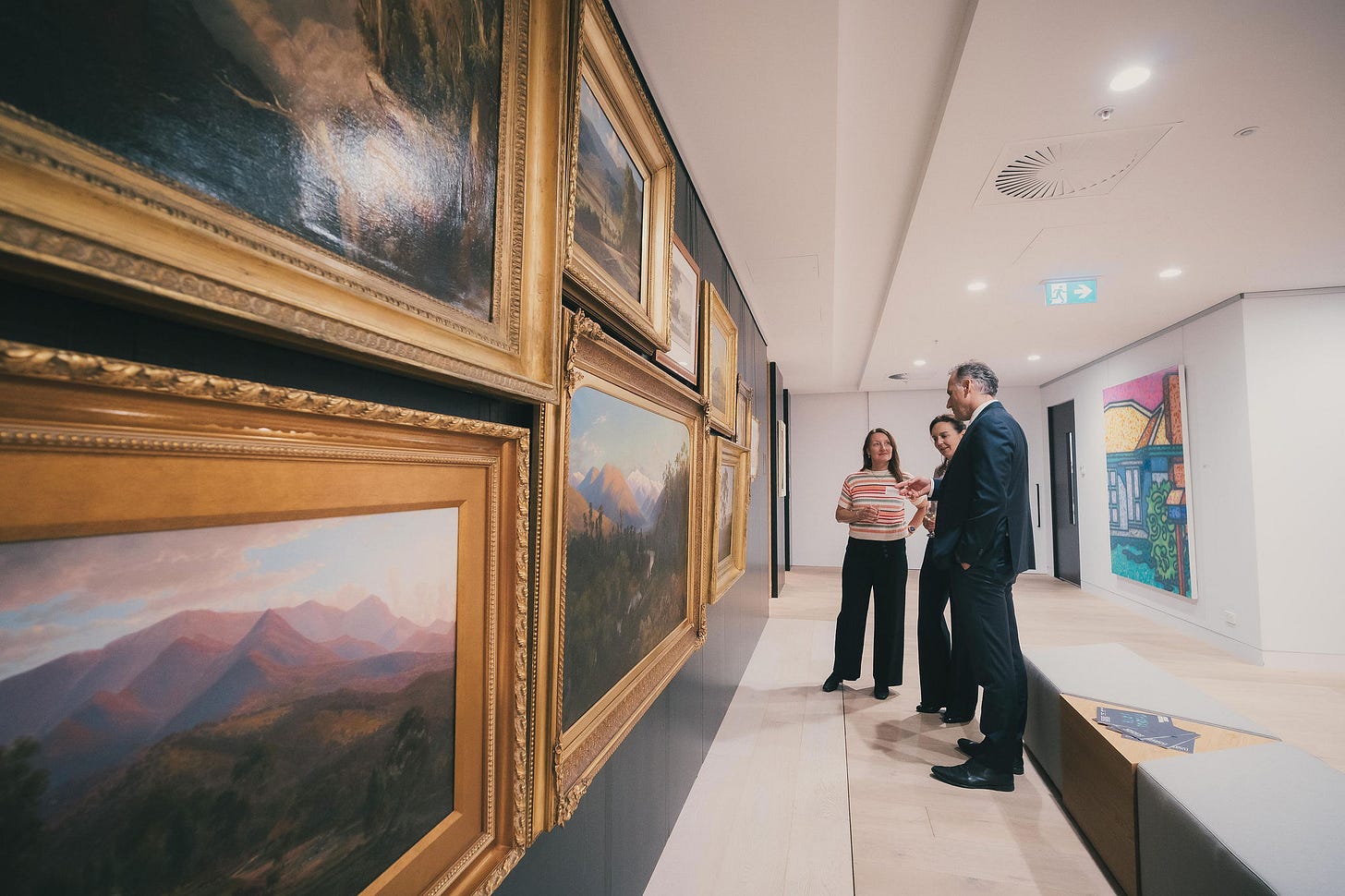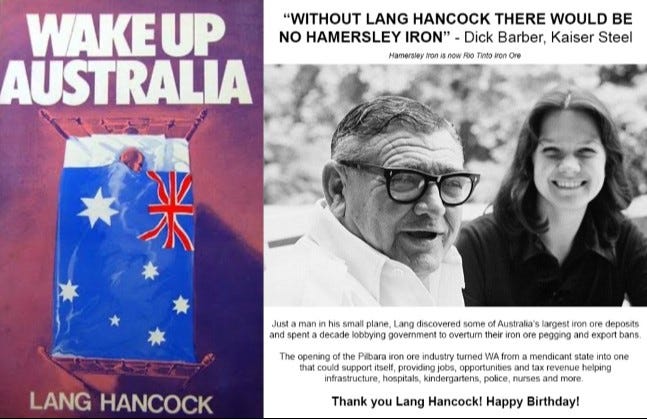Australia Day this year caused me to reflect. This is a proudly NSW-centric publication but I cannot, will not, ignore my brethren in the other states. New South Welshmen knows that their role is not merely to be part of the Federation, but to lead it. We do not apologise for this burden. We wear the mantle of leadership lightly, but wear it we must. Without us, there is no Australia: The Nation begins and ends with the Premier State.
In turn, we do not begrudge the petty chauvinisms of the more peripheral states. The parochialism of the Queenslander can be boorish but it is the price of Australian unity. Did the Prussian begrudge a bit of Bavarian or Rhenish rhetorical apartness? Such is natural in a federation and is arguably healthy for alleviating tensions arising from the normal push and pull between different levels of government. The imperial character of the New South Welshman means he understands the art of allowing the right level of harmless rebelliousness towards the centre to facilitate the operation of a hierarchy that comports with the earthy Australian character.
Problems arise, though, when state parochialism reinforces and is reinforced by political-economic factors which drive our Federation apart. The Fathers of Federation were on to something with the idea of a Nation for a Continent and a Continent for a Nation. If any foreign power could establish a proper foothold here, it would entail almost immediate war which would, in the end, once-again result in a re-united continent, albeit this time wearing the stains of much bloodshed and possibly under foreign control. Continental unity is a non-negotiable security imperative and thus, I must move our discussion onto difficult terrain: Western Australia.
WA has always seen itself as somewhat separate from the rest of Australia and with some good reason. The Colony was established in 1829 but significant growth only came in the 1880s, with self-government achieved in 1890 - the last of the states to achieve it. Self-government came just as the Federation debates were gaining steam and while the Western Australians participated, it was with some reticence. They were the last to ratify Federation, by referendum, in 1900. In 1933 they even voted in favour of secession from Australia, to be reconstituted as an independent Dominion within the British Empire, a request which was subsequently rebuffed by the British Parliament without consideration.
The constant thread throughout Western Australian history has been the fear of being dominated by larger, more powerful and more established neighbours who are geographically 'over there' and thus can't 'get' what Western Australians need. You can see this in the continual jostles over the carve-up of GST funding. The classic Australian fear of being dominated by powerful and populous Asian neighbours is thus attenuated in the WA case by a separate fear of domination by the East Coast, a fear which can make for easy political hay for sandgroper politicians.
This tendency could become particularly dangerous given WA's economic structure, which is a microcosm of Australia as a whole: a structure heavily dependent on resource extraction (particularly iron ore in the case of WA) with a thin stratum of white-collar services alongside a large and growing class of bureaucratic administrators and transfer payment recipients. The private owners of the natural resources which drive the state make huge amounts of money from their assets and accordingly, are wary of political efforts that would restrict their ability to sell their output to the highest bidder. In most cases, this bidder is China.
The tendency to see Australia as merely an economic launchpad for a handful of mining proprietors is exacerbated by the insularity of the Western Australian establishment. Without the moderating (relative) economic complexity of Victoria or New South Wales, there is little in the way of a countervailing force to encourage greater integration with Australia as a whole and to push back against separatist tendencies among the leading lights of the western state.
If there's one word to describe the WA establishment it's cozy. Key business institutions include the iron ore miners, primarily BHP, Rio Tinto, Fortescue (Andrew Forrest) and Roy Hill (Gina Rinehart), the gas producer Woodside and the titanic conglomerate Wesfarmers, which styles itself as an Australian General Electric but is, like Australian business at large, structured around resource extraction and retail [disclaimer: I am a former employee of a Wesfarmers subsidiary]. The main newspaper is the West Australian, owned by Kerry Stokes' 7West, also the owner of the Seven Network television station and the Westrac Caterpillar dealership group.
The political and business realm has an unusually high number of dynastic clans, like the father-son Premier duo family, the Courts. When Court the younger left politics he went onto the boards of a number of Stokes' companies. Then there's the Chaney clan, which has included multiple generations of Liberal Party ministers (Fred Senior, Fred Junior) and Michael, former CEO and current Chairman of Wesfarmers. Michael's daughter is Kate Chaney, the Teal 'independent' now representing the plum federal seat of Curtin. There's Gina Rinehart, Australia's wealthiest person (and woman!), daughter of the driving force behind opening up the Pilbara for iron ore extraction, Lang Hancock. And of course we couldn't forget the Forrests, most prominently represented by Australia's second wealthiest person, Andrew or 'Twiggy'. His great-grandad Mervyn was a wealthy pastoralist and member of the WA Parliament, with Mervyn's brother John becoming Premier and leading WA through the Federation debates in the 1890s.
Some external talent is injected via the military: Premier-cum-COVID-caudillo Mark McGowan was from Newcastle originally but came to town with the Navy, while the Member for the SAS Andrew Hastie was a Sydney boy before he was a resident of Campbell Barracks.
In the end though, it's a small club. Wesfarmers' Terry Bowen (Adelaide originally), despite a glittering career, was passed over for Rob Scott (Perth boy). Terry's done alright since, and he's on the board of the West Coast Eagles (try doing a 6-degrees of separation exercise between that group and the rest of Perth's elite) but one wouldn’t be surprised if they were to learn there was some hometown feeling which got Rob over the line.
The central problem is this: while the small Western Australian economic and political elite are increasingly tempted by integration with the Chinese as a resource colony, the traditional virtues of this elite are simultaneously degenerating into something vicious, meaning their ability to resist incorporation into the Chinese order is diminishing. Parochial separatism has given way to a derivative cosmopolitanism (as shown by Kate Chaney's Teal tilt, climate change and integrity!). The Faustian drive to conquer the lunar landscape of the WA outback for profit and national greatness has given way to a mewling submissiveness to the Chinese (hello Mr McGowan). The hope that patriotism alone might see a correction is slim. At this point, asking a West Australian businessman or politician what's good for the country as a whole would be like asking Pol Pot how to establish a thriving arts scene.
The most egregious and emblematic example of Westralian elite decadence was Andrew Forrest's stunt in April 2020, inviting the Chinese Consul-General to a press conference with then Health Minister Greg Hunt without Hunt's knowledge, ambushing him on TV in front of the entire country, with the Consul-General using the opportunity to push China's credentials at a time of high tension between our country and theirs given the outbreak of COVID-19. Forrest later tried to downplay the incident, but it was obvious what had occurred: One of Australia's wealthiest men humiliated a Minister of the Government of the Commonwealth of Australia in favour of the foreign power that was the source of his wealth.
Now it would appear that since that fiasco, Forrest may have received a bit of a talking-to. A mere six months later, Forrest's private investment company purchased the dinky-di bootmaker R. M. Williams with a promise to expand domestic manufacturing, and in late 2023 he purchased true-blue hatmaker Akubra. In addition, he has gone ga-ga over renewable energy and exporting hydrogen, with the idea that the secondary processing required for this would all be done in Australia – a silly idea but one at least nominally predicated on some flow-on benefits to Australia.
Similarly, Wesfarmers sold out of its coal mine investments in early 2018, ostensibly because the mining industry's business cycle was too volatile and didn't provide the steady cashflows that WES was after (despite being highly profitable on average). And yet, lo and behold, by 2019 Wesfarmers had decided to deal themselves into the rare earth / critical minerals game by buying lithium producer Lynas Corp. Now there was no doubt a solid business rationale in making the purchase, but one is once again led to wonder if some external suggestions of a more strategic nature were made to Wesfarmers' leadership. This was, after all, a time when the Western world was waking up to the fact that China had silently positioned itself as the main global producer of rare earth minerals essential for the production of high-end technology, including weaponry.
So while it's possible there is some degree of integration of WA's elite with national interests, there is a need for something more structural. Discrete (and discreet) action from national security actors is a blunt instrument that will over time build political resentment in the West Australian elite. What is needed is the creation of a class of WA business interests that are rivals for the Chinese dollar in bidding for their resources.
Lang Hancock had previously suggested connecting WA's iron ore resources via overland rail with Queensland's thermal coal resources to build a gigantic steel smelting industry, the "Iron Boomerang". Unfortunately, while this idea still has the backing of the likes of One Nation and the Citizens' Party, it doesn't look likely to happen anytime soon. Another option, perhaps more politically viable, would be a National Export Volume Auction, which would exploit our position as a low-cost producer of iron ore to raise substantial funds and sequester ore for local use. This isn't as far-fetched as it might initially sound: WA is already a leader in sequestering local natural gas production to keep energy prices low.
By providing low cost ore and some degree of industry funding for infrastructure, a local WA champion firm/firms producing high-quality steel could be established, unconnected to the existing ore oligarchs, providing a political-economic counterweight to excessive Chinese economic integration. The only exception to the no-oligarch policy might be Gina Rinehart, due to her growing integration with the national patriotic/conservative political complex. With her involved, and the corporate entity nominally WA-based, providing plenty of local, well-paid jobs, there should be enough 'local content' to gain a hometown advantage, voiding any opportunity for the iron ore producers to whip up local political jingoism against the move.
The establishment of a national steel industry utilising WA iron ore will have the dual benefits of bringing WA closer into alignment with the rest of Australia, while providing a greater level of sovereign capability in a material critical to industrial and military requirements.
Simple. See? This is why we put New South Welshmen in charge.








"This is why we put New South Welshmen in charge." Non sequitur, satire, or just plain BS? Or maybe I'm just being "boorish".